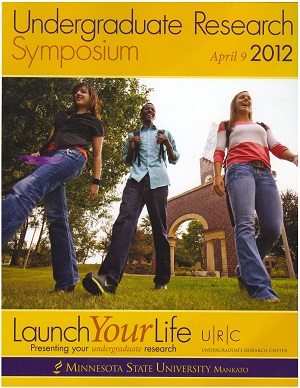Polarization Recovery in MIMO Optical Receivers Using Blind Equalization
Location
CSU 201
Start Date
9-4-2012 9:00 AM
End Date
9-4-2012 10:00 AM
Student's Major
Electrical and Computer Engineering and Technology
Student's College
Science, Engineering and Technology
Mentor's Name
Qun Zhang
Mentor's Department
Electrical and Computer Engineering and Technology
Mentor's College
Science, Engineering and Technology
Second Mentor's Name
Craig Huang
Second Mentor's Department
Electrical and Computer Engineering and Technology
Second Mentor's College
Science, Engineering and Technology
Description
Adaptive filters are smart signal processing devices that can learn from their concerned system environment, and configure themselves accordingly to perform desired functions. Furthermore, adaptive filters have the capability to adapt to environmental change and continuously update themselves to deliver designed performance. In this regards, adaptive filters are true artificial intelligent machines. Here we study the performance of an adaptive filter with blind equalization (i.e., without firstly giving the filter any training) in optical receivers, for a multiple input multiple output (MIMO) communication channel. In this research, two signals with orthogonal polarizations can be used to carry different information, so that the capacity of the system doubles compared to using only one signal with a single polarization. During signal propagation, the two input polarizations will be mixed together by the optical fiber channel and cannot be separated by a simple receiver. To recover the polarization and separate the received signal into the original transmitted signals, a polarization diversity receiver is used to convert the received signal to multiple outputs for use by an adaptive filter using one kind of blind equalization method i.e., the constant modulus method (CMA). After a brief introduction to simulation system setup for a realistic dual polarization optical fiber communication channel, we present the performance of the adaptive filter on the filter startup state, filter updating step-size, and gradient noise.
Polarization Recovery in MIMO Optical Receivers Using Blind Equalization
CSU 201
Adaptive filters are smart signal processing devices that can learn from their concerned system environment, and configure themselves accordingly to perform desired functions. Furthermore, adaptive filters have the capability to adapt to environmental change and continuously update themselves to deliver designed performance. In this regards, adaptive filters are true artificial intelligent machines. Here we study the performance of an adaptive filter with blind equalization (i.e., without firstly giving the filter any training) in optical receivers, for a multiple input multiple output (MIMO) communication channel. In this research, two signals with orthogonal polarizations can be used to carry different information, so that the capacity of the system doubles compared to using only one signal with a single polarization. During signal propagation, the two input polarizations will be mixed together by the optical fiber channel and cannot be separated by a simple receiver. To recover the polarization and separate the received signal into the original transmitted signals, a polarization diversity receiver is used to convert the received signal to multiple outputs for use by an adaptive filter using one kind of blind equalization method i.e., the constant modulus method (CMA). After a brief introduction to simulation system setup for a realistic dual polarization optical fiber communication channel, we present the performance of the adaptive filter on the filter startup state, filter updating step-size, and gradient noise.
Recommended Citation
Dosa, Bushara. "Polarization Recovery in MIMO Optical Receivers Using Blind Equalization." Undergraduate Research Symposium, Mankato, MN, April 9, 2012.
https://cornerstone.lib.mnsu.edu/urs/2012/oral-session-01/2




